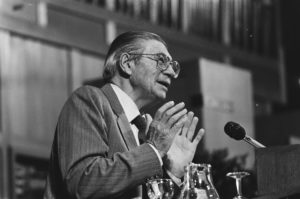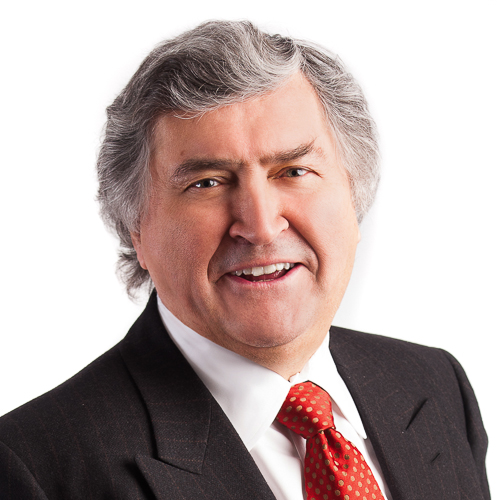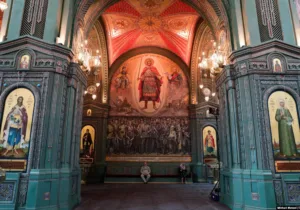Archbishop Desmond Tutu’s death on December 26 has rightly drawn praise for his life. I was fortunate enough to meet him in Vancouver way back in 1976, when he was little known. His prophetic exposition of the situation in South Africa combined with his good humor was powerful and moving. I met him again in the 1990s when I was often in South Africa during its transition to democracy.
My visits’ purpose then was mainly theological: to persuade staunchly Calvinist Afrikaners to reject apartheid as not only unjust but, closer to the heart, un-Christian. Appeals to notions of human rights would not do since they were often seen simply as Western liberalism, which they had already rejected as enshrining individualism. It would be analogous to arguing with Islamist extremists—Wahhabis or, even more so, al-Qaeda or later ISIS—from a Western individualist viewpoint. That position has no conceptual traction in their world. What is needed is criticism from other Muslims. Similarly, in South Africa, one need was for a robust theological, especially Calvinist, critique.
In this I might have had something small to offer. Much earlier, when Calvin College’s (now Calvin University’s) H.H. Meeter Center for Calvin Studies canvassed for someone to update H.H Meeter’s central work The Basic Ideas of Calvinism, I was chosen to write the revision. How much more Calvinist could one be?
An argument that apartheid was not only un-Christian but specifically un-Calvinist could possibly have an effect, as might the realization that every other Calvinist body in the world rejected it, not to mention the majority of South Africa’s own Calvinists, who, it is often forgotten, were not white.
Later, there was another inroad. In 1998, I was asked to advise the new South African government on language policy. The country’s new constitution enshrined 11 official languages and gave legal status of various kinds to some 14 other languages. In the abstract this was all well and good, but how on earth was a country with limited resources to give flesh and tongue to such an expansive, and for the time being unachievable, guarantee that everywhere in the country one could address any government office in any official language? Could you guarantee that someone could go to a post office in Cape Town and be served in Venda or Xhosa?
In 1998, I was asked not because of any theological expertise but simply because I was from a country, Canada, which has two official languages and another nine languages that have legal status. For the same reason, they invited Belgian and Swiss advisors, whose constitutions give similar language guarantees. I won’t get into our recommendations, except to say that we advised that they should pragmatically limit what could in practice be guaranteed.
The Truth and Reconciliation Commission
Back to Archbishop Tutu, whose work chairing South Africa’s Truth and Reconciliation and Commission in the late 1990s was perhaps his finest hour. This was a Commission that, inter alia, called on people to tell the truth about the evil that they had done under apartheid. In return, they would not be charged for anything that they confessed. For anything that they kept hidden, they could later be prosecuted.
In 1998, I interviewed one Commissioner (not Tutu) and asked about how he saw their duties. After the formal taped interview, the Commissioner asked, kindly, “We seem to be being interviewed by everyone in the world. Why is the world so interested in what we do?”
I thought for a while and responded, “I think it is because this is the only government body in the world that has forgiveness as part of its mandate.”
He also thought for a while and then, as a distinguished and careful lawyer, said precisely, “But we do not forgive. We simply give amnesty—we will not prosecute people for things that they have admitted.”
He was legally correct. But in the same room were two ladies whose job was to reach out into the communities to encourage people to come and testify before the Commission about what they had done and, for most, what had been done to them. When the Commissioner replied, they laughed and said, “’That’s what he says as a lawyer, but what is really happening on the ground is, ‘“If you confess your sins, He is faithful and just to forgive you your sins’” That is what is really happening in the community.”
This is an area where the archbishop thrived. The lawyers could work out the amnesty details, but he, and most of the people involved in the Commission’s outreach, addressed the more human and divine fundamental realities of confession, repentance, and forgiveness. When he chaired the Commission, this came to the fore. When he was away, it became more legalistic.
This brings me to another man I was privileged to meet, Beyers Naudé, who is sadly lesser-known but equally a prominent opponent of apartheid. Archbishop Tutu’s Anglican church was largely tied to the Anglo community in South Africa, a body that was becoming politically marginalized. But Naudé came from near the heart of the Afrikaner elite, and could divide that community, and so was seen as a major threat.
Christiaan Frederick Beyers Naudé
Beyers Naudé was born in 1915 and was named for General Christiaan Frederick Beyers, under whom his father had served during the Second Anglo-Boer War. He studied under the future prime minister and the chief architect of apartheid, Hendrik Verwoerd, and in 1939 was ordained as a minister in the Dutch Reformed Church (DRC). He also became the youngest member of the Broederbond (“Brotherhood”), which his father had helped found. The Broederbond was the powerful Afrikaner men’s secret society, almost the shadow government, that played a dominant role in apartheid and in the National Party that won power in 1948 and implemented the policy of racial segregation.
He served in various congregations and was a strong advocate of apartheid. This led him to positions of greater influence in the Afrikaner world, including becoming moderator of his church district and a high position in the Broederbond.
His position changed in the aftermath of the 1960 Sharpeville massacre, in which the South African police killed 69 Black demonstrators protesting restrictions on their freedom of movement. He began to question the attempted biblical justification of apartheid by the Dutch Reformed Church and eventually resigned from the denomination. In 1963 he founded the Christian Institute of Southern Africa (CI) with the aim of fostering reconciliation through interracial dialogue, research, and publications. Archbishop Desmond Tutu later said that at this point “Beyers became a leper in the Afrikaner community.”[1]
In 1972, the government formed the Schlebusch Commission to investigate anti-apartheid Christian organizations. When Naudé refused to testify before the Commission, he was tried and briefly imprisoned. When the CI began to work with Black African radicals like Steve Biko, Naudé was harassed by state security who, in 1977, forced the CI to close. From 1977 to 1984, Naudé was “banned,” a type of house arrest. He was then not allowed to be in the same room with more than one other person. Other leaders of the Christian Institute suffered the same fate.
Although under police surveillance, he still covertly helped anti-apartheid resistors move around and out of South Africa by providing them with old vehicles that he had repaired himself, something he later said was his main contribution. After his unbanning in 1985, he succeeded Tutu as secretary-general of the South African Council of Churches. After 1990, Naudé occasionally opened ANC events with scripture readings, and the ANC invited him as the only Afrikaner member in their delegation in negotiations with the National Party government.
Upon his death in 2004, Nelson Mandela eulogized Naudé as “a true humanitarian and a true son of Africa,” and President Thabo Mbeki, other dignitaries, and high-ranking ANC officials attended his official state funeral.
Despite being persecuted by his own ethnic group, Naudé “never outwardly expressed spite for his former opponents. ‘I am an Afrikaner,’ he said. ‘I saw myself never as anything else but an Afrikaner, and I’m very grateful for the small contribution which I could have made.’”[2]
As we remember Archbishop Tutu, we should, amongst many others, also remember the great Reverend Naudé.
[1] “Beyers Naudé’s struggle of faith,” The Independent, September 7, 2004.
[2] “C.F. Beyers Naude (sic) Dies; Cleric Opposed Apartheid Regime,” Washington Post, September 8, 2004.







